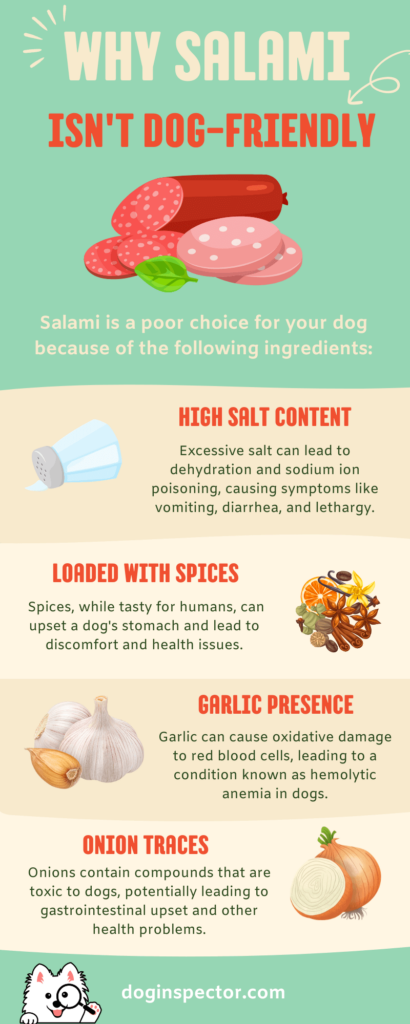Can dogs eat salami?
Salami is not great for dogs, but a small amount won’t harm them. It’s not dangerous or toxic for dogs, but it has spices and lots of salt that can be tricky for dogs to digest. Where we make a common mistake is when we use salami as a treat! Treating your dog with salami is not recommended. There are definitely better options out there.

Why is salami not recommended for dogs?
Here’s the deal with salami—it’s packed with salt and all kinds of spices. While a tiny bit won’t harm your dog, the truth is all that salt can be pretty bad for them. Too much salt can lead to some serious health issues like dehydration or even sodium ion poisoning, which sounds just as scary as it is. And those spices? Some of them, like garlic and onion, are big no-nos for dogs, potentially causing stomach upset or worse.
Onions and garlic pack a punch not just in taste but also in compounds that dogs just can’t handle. These sneaky ingredients can cause something called oxidative damage to their red blood cells. Imagine those cells as little oxygen taxis in your dog’s body, and suddenly, they’re breaking down. This mess leads to a condition known as hemolytic anemia.
However, the amount of garlic and onions in salami is minimal, so it will not cause anemia if they eat a few slices.
So, while it’s tempting to share a slice with those pleading eyes watching your every move, it’s best to keep the salami to yourself and stick to healthier treats that are made just for dogs. They might not understand why they can’t have some, but trust us, it’s for the best!
What will happen if your dog eats too much salami?
Too much salami means too much salt. Salt is bad for dogs because it can lead to sodium ion poisoning. Dogs aren’t able to process large amounts of salt as efficiently as humans can, and this imbalance can cause symptoms like vomiting and diarrhea.
Then they can have issues with excessive thirst and need to pee a lot, lethargy, and in severe cases, it can lead to complications. The body’s need to balance the high sodium levels in the bloodstream pulls water from the cells, potentially leading to dehydration and affecting the dog’s kidney function.
According to the ASPCA (American Society for the Prevention of Cruelty to Animals), dogs should not be given foods high in salt and salty snacks. The ASPCA specifically warns against the dangers of feeding dogs salty foods due to the risk of sodium ion poisoning. This aligns with the general guidance from veterinarians and pet health organizations that advocate for a balanced diet tailored to a dog’s nutritional needs, emphasizing that treats and human food should not exceed 10% of a dog’s daily intake and high-salt foods should be avoided altogether.
So, while it might seem like a small piece of salty food like salami wouldn’t do much harm, over time or in large quantities, it can cause health issues for dogs. It’s always best to stick to dog-specific treats and consult with your vet about the best diet for your furry friend.
What to do if your dog eats too much salami?
If your dog sneaks a bite of salami, don’t panic! Even if he eats quite a few slices, it’s not alarming, but please keep an eye on it and call your vet if you notice something unusual! But, again, salami is not dangerous! If it’s spicy, your dog may have some tummy issues, but in our experience, it’s nothing to worry about.
Here’s what you should do if your dog eats salami:
Remember, while a small piece might not cause immediate harm, it’s always better to be cautious and opt for dog-safe treats.
Dogs should also avoid other processed meats that are way too high in salt and spices!
- Don’t give your dog hot dogs! Even though they seem like a safe treat, hot dogs are rich in sodium and if you pick up that habit of treating them with hot dogs, your dog will end up eating too much salt!
- Avoid bacon as it’s high in both salt and fat! Bacon is not good for dogs, but I know it’s their favorite treat! Give them only a tiny piece when you really think you have to, but otherwise, don’t share bacon with your dog.
- Probably, the words of all processed meats are Spam. Dogs shouldn’t eat Spam as it’s very rich in sodium and fat and, over time, can really upset their digestive system.
- And lastly, dogs really shouldn’t eat pepperoni as it’s not only salty but spicy too and has ingredients that can irritate your dog’s gentle stomach.
Happy snacking!
Love, life, and fur forever!

FAQs
Can dogs eat hard salami?
Actually, giving hard salami to dogs isn’t a good idea. Its high salt and spice content could lead to digestive and health issues.
Is Genoa salami safe for dogs to eat?
Feeding your dog Genoa salami should be avoided. Like other salamis, it’s rich in salts and spices, which aren’t suitable for canine diets.
Should dogs eat cotto salami?
It’s best to steer clear of cotto salami for your furry friend. The processing it undergoes introduces levels of salt and spices that dogs should not consume.
Can dogs have dry salami?
Dry salami is not recommended for dogs due to its similar high salt and spice content, which poses the same risks as other types of salami.
Is it okay for dogs to eat salami and pepperoni?
Combining salami and pepperoni for your dog’s snack time is not advisable. Both are processed meats high in fats, salts, and spices, which can be harmful to dogs.
Can dogs munch on salami sticks?
Salami sticks, with their appealing snack-like form, are still not a good choice for dogs. They contain high amounts of salt and spices, just like other salami products, making them unsuitable for canine consumption.